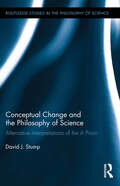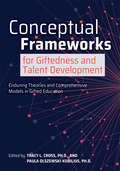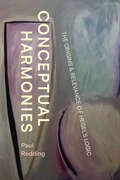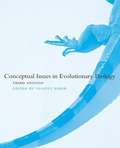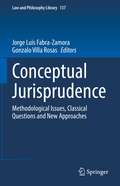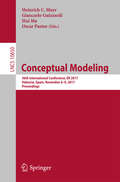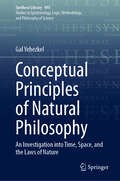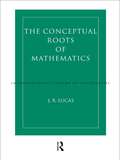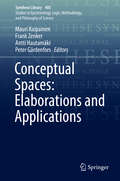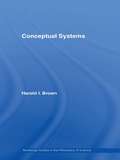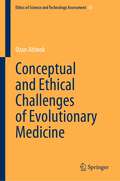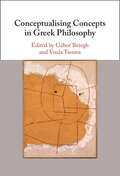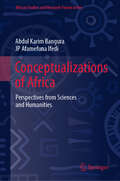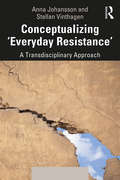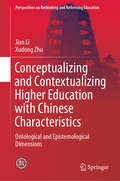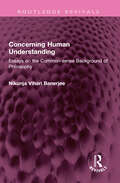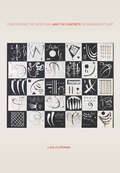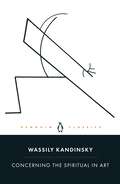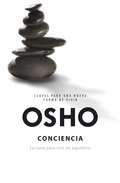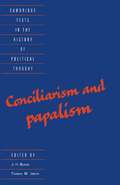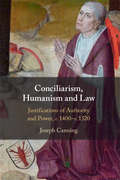- Table View
- List View
Conceptual Change and the Philosophy of Science: Alternative Interpretations of the A Priori (Routledge Studies in the Philosophy of Science)
by David J. StumpIn this book, David Stump traces alternative conceptions of the a priori in the philosophy of science and defends a unique position in the current debates over conceptual change and the constitutive elements in science. Stump emphasizes the unique epistemological status of the constitutive elements of scientific theories, constitutive elements being the necessary preconditions that must be assumed in order to conduct a particular scientific inquiry. These constitutive elements, such as logic, mathematics, and even some fundamental laws of nature, were once taken to be a priori knowledge but can change, thus leading to a dynamic or relative a priori. Stump critically examines developments in thinking about constitutive elements in science as a priori knowledge, from Kant’s fixed and absolute a priori to Quine’s holistic empiricism. By examining the relationship between conceptual change and the epistemological status of constitutive elements in science, Stump puts forward an argument that scientific revolutions can be explained and relativism can be avoided without resorting to universals or absolutes.
Conceptual Frameworks for Giftedness and Talent Development: Enduring Theories and Comprehensive Models in Gifted Education
by Paula Olszewski-Kubilius Tracy CrossConceptual Frameworks for Giftedness and Talent Development explores current and enduring theories and comprehensive models of giftedness and talent development. Each chapter:Includes a description of a different model, theory, or framework.Shares the most important implications of each model, including underrepresentation and social justice issues.Provides commentary on how each model compares to others.Includes discussion questions for use with students and professionals.The editors also consider common issues across conceptual frameworks, such as the degree to which achievement defines giftedness, the goal of gifted education, and the role of psychosocial factors. This is a comprehensive reference for scholars and practitioners in the field, as well as those studying at the graduate level.
Conceptual Harmonies: The Origins and Relevance of Hegel’s Logic
by Paul ReddingA new reading of Hegel’s Science of Logic through the history of European mathematics. Conceptual Harmonies develops an original account of G. W. F. Hegel’s perplexing Science of Logic from a simple insight: philosophical and mathematical thought have shaped each other since classical times. Situating Science of Logic within the rise of modern mathematics, Redding stresses Hegel’s attention to Pythagorean ratios, Platonic reason, and Aristotle’s geometrically inspired logic. He then explores how later traditions shaped Hegel’s world, through both Leibniz and new forms of algebraic geometry. This enlightening reading recovers an overlooked stream in Hegel’s philosophy that remains, Redding argues, important for contemporary conceptions of logic.
Conceptual Harmonies: The Origins and Relevance of Hegel’s Logic
by Paul ReddingA new reading of Hegel’s Science of Logic through the history of European mathematics.Conceptual Harmonies develops an original account of G. W. F. Hegel’s perplexing Science of Logic from a simple insight: philosophical and mathematical thought have shaped each other since classical times. Situating Science of Logic within the rise of modern mathematics, Redding stresses Hegel’s attention to Pythagorean ratios, Platonic reason, and Aristotle’s geometrically inspired logic. He then explores how later traditions shaped Hegel’s world, through both Leibniz and new forms of algebraic geometry. This enlightening reading recovers an overlooked stream in Hegel’s philosophy that remains, Redding argues, important for contemporary conceptions of logic.
Conceptual Integrated Science--explorations
by Paul HewittFrom the author of the number one textbooks in physical science and physics comes the eagerly awaiting new text, Conceptual Integrated Science. Hewitt's critically acclaimed conceptual approach has led science education for 30 years and now tackles integrated science to take student learning to a new level. Using his proven conceptual approach, accessible writing, and fun and informative illustrations, Hewitt and his team of science experts have crafted a text that focuses on the unifying concepts and real-life examples across physics, chemistry, earth science, biology, and astronomy.The book includes best-selling author Paul Hewitt's proven pedagogical approach, straight-forward learning features, approachable style, and rigorous coverage. The result is a wide-ranging science text that is uniquely effective and motivational. Conceptual Integrated Science is accompanied by an unparalleled media package that combines interactive tutorials, interactive figures, and renowned demonstration videos to help students outside of class and instructors in class.
Conceptual Issues in Evolutionary Biology
by Elliott SoberThese essays by leading scientists and philosophers address conceptual issues that arise in the theory and practice of evolutionary biology. The third edition of this widely used anthology has been substantially revised and updated. Four new sections have been added: on women in the evolutionary process, evolutionary psychology, laws in evolutionary theory, and race as social construction or biological reality. Other sections treat fitness, units of selection, adaptationism, reductionism, essentialism, species, phylogenetic inference, cultural evolution, and evolutionary ethics. Each of the twelve sections contains two or three essays that develop different views of the subject at hand. For example, the section on evolutionary psychology offers one essay by two founders of the field and another that questions its main tenets. One sign that a discipline is growing is that there are open questions, with multiple answers still in competition; the essays in this volume demonstrate that evolutionary biology and the philosophy of evolutionary biology are living, growing disciplines. ContributorsRobin O. Andreasen, Kwame Anthony Appiah, David A. Baum, John H. Beatty, David J. Buller, Leda Cosmides, James Donoghue, Steven J. Farris, Joseph Felsenstein, Susan K. Finsen, Joseph Fracchia, Stephen Jay Gould, Sarah Blaffer Hrdy, David L. Hull, Philip Kitcher, R. C. Lewontin, Elisabeth Lloyd, Ernst Mayr, Michael Ruse, John Maynard Smith, Elliott Sober, John Tooby, C. Kenneth Waters, George C. Williams, David Sloan Wilson, E. O. Wilson
Conceptual Jurisprudence: Methodological Issues, Classical Questions and New Approaches (Law and Philosophy Library #137)
by Jorge Luis Fabra-Zamora Gonzalo Villa RosasThis book brings together leading legal theorists to present original philosophical work on the concept of law - the central question of jurisprudence. It covers five broad topics: firstly it addresses debates concerning the methodology of jurisprudence. In Part II it focuses on the notion of a legal system and its coercive nature, while Part III explores the relationships between law and morality, the traditional point of contention between positivist and non-positivist theories of law. Part IV then examines questions regarding law’s normative character and relationships with practical reason. Lastly, the final part introduces two novel theoretical approaches to conceptual jurisprudence.
Conceptual Modeling: 36th International Conference, ER 2017, Valencia, Spain, November 6–9, 2017, Proceedings (Lecture Notes in Computer Science #10650)
by Heinrich C. Mayr Oscar Pastor Hui Ma Giancarlo GuizzardiConceptual modeling has always been one of the main issues in information systems engineering as it aims to describe the general knowledge of the system at an abstract level that facilitates user understanding and software development. This collection of selected papers provides a comprehensive and extremely readable overview of what conceptual modeling is and perspectives on making it more and more relevant in our society. It covers topics like modeling the human genome, blockchain technology, model-driven software development, data integration, and wiki-like repositories and demonstrates the general applicability of conceptual modeling to various problems in diverse domains. Overall, this book is a source of inspiration for everybody in academia working on the vision of creating a strong, fruitful and creative community of conceptual modelers. With this book the editors and authors want to honor Prof. Antoni Oliv#65533; for his enormous and ongoing contributions to the conceptual modeling discipline. It was presented to him on the occasion of his keynote at ER 2017 in Valencia, a conference that he has contributed to and supported for over 20 years. Thank you very much to Antoni for so many years of cooperation and friendship.
Conceptual Principles of Natural Philosophy: An Investigation into Time, Space, and the Laws of Nature (Synthese Library #495)
by Gal YehezkelThis book provides a general framework for understanding nature to revive the philosophical study of nature as a complementary research project to the empirical exploration of nature. It demonstrates that the a priori research of nature is a viable science, by articulating its principles and demonstrating their effectiveness in explaining the most fundamental features of nature – time, space, and its laws. The original contribution of this book is twofold. Firstly, it introduces a unique method for undertaking conceptual analysis. The effectiveness of these tools is demonstrated in exploring the most general and fundamental features of nature. Secondly, it introduces a novel conception of nature – "internal relationalism" – that offers an insight into the structure of nature and its most fundamental features. Thus, it offers answers to some of the most fundamental questions that have plagued philosophers and scientists for millennia, concluding with the question “Why is there something rather than nothing?” This book is of interest to metaphysics, philosophers of science who focus on the foundations of physics, and philosophically-minded physicists, especially those whose research interests include the nature of time and space.
Conceptual Roots of Mathematics: An Essay On The Philosophy Of Mathematics (International Library of Philosophy)
by J.R. LucasThe Conceptual Roots of Mathematics is a comprehensive study of the foundation of mathematics. J.R. Lucas, one of the most distinguished Oxford scholars, covers a vast amount of ground in the philosophy of mathematics, showing us that it is actually at the heart of the study of epistemology and metaphysics.
Conceptual Spaces: Elaborations and Applications (Synthese Library #405)
by Peter Gärdenfors Frank Zenker Mauri Kaipainen Antti HautamäkiThis edited book focuses on concepts and their applications using the theory of conceptual spaces, one of today’s most central tracks of cognitive science discourse. It features 15 papers based on topics presented at the Conceptual Spaces @ Work 2016 conference. The contributors interweave both theory and applications in their papers. Among the first mentioned are studies on metatheories, logical and systemic implications of the theory, as well as relations between concepts and language. Examples of the latter include explanatory models of paradigm shifts and evolution in science as well as dilemmas and issues of health, ethics, and education. The theory of conceptual spaces overcomes many translational issues between academic theoretization and practical applications. The paradigm is mainly associated with structural explanations, such as categorization and meronomy. However, the community has also been relating it to relations, functions, and systems. The book presents work that provides a geometric model for the representation of human conceptual knowledge that bridges the symbolic and the sub-conceptual levels of representation. The model has already proven to have a broad range of applicability beyond cognitive science and even across a number of disciplines related to concepts and representation.
Conceptual Systems (Routledge Studies in the Philosophy of Science)
by Harold I. BrownNew concepts are constantly being introduced into our thinking. Conceptual Systems explores how these new concepts are entered into our systems along with sufficient continuity with older ideas to ensure understanding. The encyclopedic breadth of this text highlights the many different aspects and disciplines that together present an insightful view into the various theories of concepts. Harold Brown, a reputable author in the philosophy of science examines several historically influential theories of concepts as well as presenting a clear view on the general theory of conceptual change. Case studies discuss examples of conceptual change in the history of physics including the move in seventeenth century physics from Galileo to Descates to Newton; and the conceptual framework of the 'standard model' in the late twentieth century high-energy physics. The key central themes in the philosophy of science that are explored in detail in this enormous book make it an essential read for academics in this field.
Conceptual and Ethical Challenges of Evolutionary Medicine (Ethics of Science and Technology Assessment #53)
by Ozan AltinokThis book analyses the concept of disease, as defined in the context of evolutionary medicine. Upon introducing the reader to evolutionary medicine in its current form and describing its approach to disease instances, the book leverages thoughts and instruments of knowledge of epistemology, social sciences, and ethics to answer the question: “How can we build a timely and appropriate concept of disease?” At first, it looks at the social concerns of medicalization, for example focusing on the suffering of people who have not been diagnosed, or whose suffering is not caused by certain elements that falls under the definitions of disease. In turn, it merges different, both conceptual and empirical considerations in one comprehensive analysis, with the aim of fostering a multidisciplinary understanding of the phenomenon of disease. This book also highlights certain kinds of epistemic injustices that are taking place in the healthcare system, as this is currently conceived in post-industrial societies, thus offering a timely contribution to the current debate around social justice in healthcare.
Conceptualising Concepts in Greek Philosophy
by Gábor Betegh Voula TsounaConcepts are basic features of rationality. Debates surrounding them have been central to the study of philosophy in the medieval and modern periods, as well as in the analytical and Continental traditions. This book studies ancient Greek approaches to the various notions of concept, exploring the early history of conceptual theory and its associated philosophical debates from the end of the archaic age to the end of antiquity. When and how did the notion of concept emerge and evolve, what questions were raised by ancient philosophers in the Greco-Roman tradition about concepts, and what were the theoretical presuppositions that made the emergence of a notion of concept possible? The volume furthers our own contemporary understanding of the nature of concepts, concept formation, and concept use. This title is part of the Flip it Open Programme and may also be available Open Access. Check our website Cambridge Core for details.
Conceptualizations of Africa: Perspectives from Sciences and Humanities (African Studies and Research Forum Series)
by Abdul Karim Bangura Jp Afamefuna IfediThis book discusses how Africa has been understood and defined across various academic fields. Building on the influential works of Valentin-Yves Mudimbe and more recent studies by Axel Fleisch and Rhiannon Stephens, this book bridges previous limitations by offering a comprehensive, interdisciplinary analysis. Each chapter examines the conceptualization of Africa within a specific discipline, balancing local and global perspectives, blending competing viewpoints, and providing suggestions for future research. The book will be essential for students, scholars, and researchers interested in a better understanding of the diverse and complex narratives that shape our knowledge of Africa and its intellectual heritage.
Conceptualizing 'Everyday Resistance': A Transdisciplinary Approach
by Anna Johansson Stellan VinthagenEveryday resistance is about the many ways people undermine power and domination through their routine and everyday actions. Unlike open rebellions or demonstrations, it is typically hidden, not politically articulated, and often ingenious. But because of its disguised nature, it is often poorly understood as a form of politics and its potential underestimated. Conceptualizing 'Everyday Resistance' presents an analytical framework and theoretical tools to understand the entanglements of everyday power and resistance. These are applied to diverse empirical cases including queer relationships in the context of heteronormativity, Palestinian daily life under military occupation, workplace behaviors under office surveillance, and the tactics of fat acceptance bloggers facing the war against obesity. Johansson and Vinthagen argue that everyday resistance is best understood by accounting for different repertoires of tactics, relations between actors and struggles around constructions of time and space. Through a critical dialogue with the work of James C. Scott, Michel de Certeau and Asef Bayat, they aim to reconstruct the field of resistance studies, expanding what counts as resistance and building systematic analysis. Conceptualizing 'Everyday Resistance' offers researchers and students from different theoretical and empirical backgrounds an essential overview of the field and a creative framework that illuminates the potential of all people to transform society.
Conceptualizing and Contextualizing Higher Education with Chinese Characteristics: Ontological and Epistemological Dimensions (Perspectives on Rethinking and Reforming Education)
by Jian Li Xudong ZhuThis book provides a fresh and unique overview of the modernization and internationalization of Chinese higher education, focusing on Chinese higher education from 1949 to 2018. It presents the Ontological Positivism Model (Conceptualization-Explicit-Formal-Share), concentrating on concepts of Chinese higher education.The book is intended for scholars and researchers in the field of comparative higher education, administrators and stakeholders in education management and graduate students majoring in higher education.
Concerning Human Understanding: Essays on the Common-sense Background of Philosophy (Routledge Revivals)
by Nikunja Vihari BanerjeeFirst published in 1958 Concerning Human Understanding treats the chief problems of philosophy. Professor Banerjee’s intention is ‘to separate philosophic thought from effects of sophistication and intellectual pride to which philosophical enquiry is usually prone’. The book pursues a line of thought which calls for the replacement of certain old beliefs that are still dominant in philosophical circles, suggests the need for a fresh enquiry into some of the problems of philosophy and brings into prominence others which have generally escaped the serious attention of philosophers in modern times. It offers a restatement of the problems of knowledge, attempts a solution of the conflict between science and philosophy and handles the baffling problem: ‘is metaphysics possible?’ In particular this book deals with the problem of religion in its bearing upon the future of civilization and finds the solution in an outlook on life opposed to the surrender of man to Institution and Power and founded upon the feeling of obligation regarded as ‘the most human of the forces that deserve to govern the world of human affairs and to shape the destiny of man’. This is a must read for students of philosophy.
Concerning the Spiritual and the Concrete in Kandinsky's Art
by Lisa FlormanThis book examines the art and writings of Wassily Kandinsky, who is widely regarded as one of the first artists to produce non-representational paintings. Crucial to an understanding of Kandinsky's intentions is On the Spiritual in Art, the celebrated essay he published in 1911. Where most scholars have taken its repeated references to "spirit" as signaling quasi-religious or mystical concerns, Florman argues instead that Kandinsky's primary frame of reference was G. W. F. Hegel's Aesthetics, in which art had similarly been presented as a vehicle for the developing self-consciousness of spirit (or Geist, in German). In addition to close readings of Kandinsky's writings, the book also includes a discussion of a 1936 essay on the artist's paintings written by his own nephew, philosopher Alexandre Kojève, the foremost Hegel scholar in France at that time. It also provides detailed analyses of individual paintings by Kandinsky, demonstrating how the development of his oeuvre challenges Hegel's views on modern art, yet operates in much the same manner as does Hegel's philosophical system. Through the work of a single, crucial artist, Florman presents a radical new account of why painting turned to abstraction in the early years of the twentieth century.
Concerning the Spiritual and the Concrete in Kandinsky's Art
by Lisa FlormanThis book examines the art and writings of Wassily Kandinsky, who is widely regarded as one of the first artists to produce non-representational paintings. Crucial to an understanding of Kandinsky's intentions is On the Spiritual in Art, the celebrated essay he published in 1911. Where most scholars have taken its repeated references to "spirit" as signaling quasi-religious or mystical concerns, Florman argues instead that Kandinsky's primary frame of reference was G. W. F. Hegel's Aesthetics, in which art had similarly been presented as a vehicle for the developing self-consciousness of spirit (or Geist, in German). In addition to close readings of Kandinsky's writings, the book also includes a discussion of a 1936 essay on the artist's paintings written by his own nephew, philosopher Alexandre Kojève, the foremost Hegel scholar in France at that time. It also provides detailed analyses of individual paintings by Kandinsky, demonstrating how the development of his oeuvre challenges Hegel's views on modern art, yet operates in much the same manner as does Hegel's philosophical system. Through the work of a single, crucial artist, Florman presents a radical new account of why painting turned to abstraction in the early years of the twentieth century.
Concerning the Spiritual in Art
by Wassily KandinskyA seminal text in the history of modern art, from one of the most famous artists of the twentieth century‘Art is the language that speaks to the soul’Why do we make art? In Concerning the Spiritual in Art Wassily Kandinsky, one of the earliest and most famous abstract painters, argued against ‘art for art’s sake’. Exploring form and colour, spirituality and tradition, Kandinsky instead predicted a future for painting in its potential to redirect the attention of viewers away from the shallow materialism of the modern world toward the more profound intellectual and emotional concerns of their interior lives. His revolutionary work became a landmark in modern art history, helping to usher in the age of non-representational painting. This new translation also includes Kandinsky’s later essay, ‘The Question of Form’, in which he interrogates and sharpens many of his earlier ideas.A new translation by Ruth Ahmedzai KempWith an introduction by Lisa Florman
Conciencia: La clave para vivir en equilibrio
by Osho OshoCuanto más consciente se vuelve uno, más se recuerda a sí mismo, con más cautela actúa, más alerta está, más heridas empiezan a desaparecer, hay menos brotes de ira, menos odio, menos celos y menos sentimientos posesivos.Un día, uno simplemente descubre que todo eso se ha vuelto irrelevante, ha pasado a ser historia antigua, ya no se trata de cuestiones vivas sino de cuestiones muertas. Cuanto más consciente se vuelve uno, más y más heridas se curan y más se afianza la salud y la integridad.En esto consiste el milagro de adquirir conciencia: en que todo lo que es erróneo empieza a desvanecerse y todo lo que es correctoempieza a suceder. Individualmente, y como sociedad, la cuestión primordial es decidir si preferimos estar dormidos o despiertos, inconscientes o conscientes.Este libro presenta un mapa del despertar de la mano de la sabiduría de Osho.
Conciliarism And Papalism
by Quentin Skinner Raymond Geuss Thomas M. Izbicki J. H. BurnsAlmost on the eve of the sixteenth-century Reformation, the long-running debate over the respective authority of popes and councils in the Catholic Church was vigorously resumed. In this collection the editors bring together the first English translation of four major contributions to that debate. In these texts, complex arguments derived from Scripture, theology, and canon law are deployed. The issues that emerge, however, prove to have a broader significance. What is foreshadowed here is the confrontation between 'absolutism' and 'constitutionalism' which was to be a dominant theme in the politics of early-modern Europe and beyond. Even on the threshold of the twenty-first century the concerns that underlie and animate the scholastic disputations in these pages retain their force. This 1997 volume includes introductory material which elucidates the context of the debate, as well as a comprehensive bibliography.
Conciliarism, Humanism and Law: Justifications of Authority and Power, c. 1400–c. 1520
by Joseph CanningHow was power justified in late medieval Europe? What justifications did people find convincing, and why? Based around the two key intellectual movements of the fifteenth century, conciliarism in the church and humanism, this study explores the justifications for the distribution of power and authority in fifteenth- and early sixteenth-century Europe. By examining the arguments that convinced people in this period, Joseph Canning demonstrates that it was almost universally assumed that power had to be justified but that there were fundamentally different kinds of justification employed. Against the background of juristic thought, Canning presents a new interpretative approach to the justifications of power through the lenses of conciliarism, humanism and law, throwing fresh light on our understanding of both conciliarists' ideas and the contribution of Italian Renaissance humanists.
